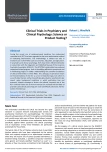-
Články
- Časopisy
- Kurzy
- Témy
- Kongresy
- Videa
- Podcasty
Clinical Trials in Psychiatry and Clinical Psychology: Science or Product Testing?
During the recent era of evidence-based medicine, the randomized controlled trial (RCT) has been regarded as the most authoritative method of evaluating interventions. The methodology is utilized not only in medicine, but in other fields such as economics, education, and agriculture. In psychiatry and clinical psychology, RCTs have been utilized extensively in conjunction with the Diagnostic and Statistical Manual of the American Psychiatric Association (DSM) [1]. This RCT/DSM combination has produced somewhat limited progress, both in identifying efficacious treatments and in facilitating progress in better understanding the scientific foundations of clinical intervention in these fields. This unhappy circumstance results not from limitations of the RCT as a tool of inductive logic, but rather its use with data that are neither theoretically grounded nor psychometrically sound, under background conditions in which publication bias and economic interest converge to distort the rational, impartial use of the RCT. Until the biases due to human interests are reduced and the fields of psychiatry and clinical psychology are more scientifically advanced, the RCT will be of limited use.
Key words:
Clinical Trials; RCT; DSM; MethodologyAbbreviations:
RCT - Randomized Controlled Trial; DSM - Diagnostic and Statistical Manual of the American Psychiatric Association
Autoři: Robert L. Woolfolk
Působiště autorů: Department of Psychology, Rutgers University, United states
Vyšlo v časopise: Acta Psychopathologica, 1, 2015, č. 2:12, s. 1-4
Related article at Pubmed, Scholar Google
Visit for more related articles at Acta Psychopathologica
© Under License of Creative Commons Attribution 3.0 License
This article is available from: www.psychopathology.imedpub.comSouhrn
During the recent era of evidence-based medicine, the randomized controlled trial (RCT) has been regarded as the most authoritative method of evaluating interventions. The methodology is utilized not only in medicine, but in other fields such as economics, education, and agriculture. In psychiatry and clinical psychology, RCTs have been utilized extensively in conjunction with the Diagnostic and Statistical Manual of the American Psychiatric Association (DSM) [1]. This RCT/DSM combination has produced somewhat limited progress, both in identifying efficacious treatments and in facilitating progress in better understanding the scientific foundations of clinical intervention in these fields. This unhappy circumstance results not from limitations of the RCT as a tool of inductive logic, but rather its use with data that are neither theoretically grounded nor psychometrically sound, under background conditions in which publication bias and economic interest converge to distort the rational, impartial use of the RCT. Until the biases due to human interests are reduced and the fields of psychiatry and clinical psychology are more scientifically advanced, the RCT will be of limited use.
Key words:
Clinical Trials; RCT; DSM; MethodologyAbbreviations:
RCT - Randomized Controlled Trial; DSM - Diagnostic and Statistical Manual of the American Psychiatric Association
Zdroje
1. American Psychiatric Association (2013) Diagnostic and statistical manual of mental disorders (5th ed) Washington.
2. Hyman SE (2012) Revolution stalled. Sci. Transl. Med. 4 : 155cm11.
3. Insel TR (2012) Next-generation treatments for mental disorders. Sci. Transl. Med 4 : 1-9.
4. G. Miller (2010) Ispharma running out of brainy ideas? Science 329 : 502-504.
5. Abbott A (2011) Novartis to shut brain research facility: Drug giant redirects psychiatric efforts to genetics. Nature 480 : 161-162.
6. Fisher RA (1971) Collected papers of R. A. Fisher(Ed.), J.H. Bennett., Adelaide: The University of Adelaide Press
7. Meldrum ML (2000) A brief history of the randomized controlled trial: From oranges and lemons to the gold standard.HematolOncolClin North Am 14 : 745-760.
8. Mill JS (1843) System of logic: Ratiocinative and inductive. In J. M. Robson (Ed.), The collected works of John Stuart Mill (Vols. 7 & 8). Toronto, Ontario, Canada: University of Toronto Press (1973) - Original work published.
9. Ioannidis JP (2005) Contradicted and initially stronger effects in highly cited clinical research. Journal of the American Medical Association 294 : 218-228.
10. Mathieu S, Boutron I, Moher D, Altman DG, Ravaud P (2009) Comparison of registered and published primary outcomes in randomized controlled trials. Journal of the American Medical Association 302 : 977-984.
11. Fanelli D (2011) Negative results are disappearing from most disciplines and countries. Scientometrics 90 : 891-904.
12. Insel TR (2013) Director’s blog: Transforming diagnosis. Retrieved October 15, 2013, from the National Institute of Mental Health site.
13. Mathieu S, Boutron I, Moher D, Altman DG &Ravaud P (2009) Comparison of registered and published primary outcomes in randomized controlled trials. Journal of the American Medical Association 302 : 977-984.
14. Vedula SS, Bero L, Scherer RW, Dickersin K (2009) Outcome reporting in industry-sponsored trials of gabapentin for off-label use. N Engl J Med 361 : 1963-1971.
15. Kazdin AE (2006) Assessment and evaluation in clinical practice. In Goodheart CD, Kazdin AE, Sternberg RJ (Eds.), Evidence-based psychotherapy: Where practice and research meet. Washington, DC: American Psychological Association 153-177.
16. Barlow DH, Allen LB, Choate ML (2004) Toward a unified treatment for emotional disorders. Behaviour and Research Therapy 35 : 205-230.
17. Freeman D (2011) Improving cognitive treatments for delusions. Schizophr Res 132 : 135-139.
18. Ioannidis JP (2005)Why most published research findings are false. PLoSMedicine 2 : 696-701.
Štítky
Psychológia
Článok vyšiel v časopiseActa Psychopathologica
Najčítanejšie tento týždeň
2015 Číslo 2:12
Najčítanejšie v tomto čísle- Clinical Trials in Psychiatry and Clinical Psychology: Science or Product Testing?
- Singlehood among Adults with Intellectual Disability: Psychological and Sociological Perspectives
Prihlásenie#ADS_BOTTOM_SCRIPTS#Zabudnuté hesloZadajte e-mailovú adresu, s ktorou ste vytvárali účet. Budú Vám na ňu zasielané informácie k nastaveniu nového hesla.
- Časopisy



